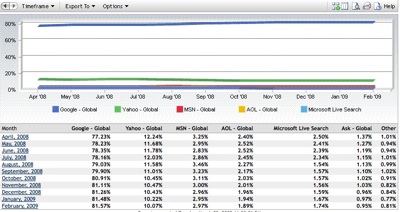Yahoo Adds Behavioral Targeting Features for Search and Display Ads
Yahoo introduced several tools that it says will help marketers target their ads more efficiently at a time when many of them are cutting advertising spending drastically.
- Search Retargeting for Display Ads – lets advertisers target display advertising based on a user’s search activity. So a user that searches on a term like “sandals” could be served a display ad for footwear elsewhere on Yahoo’s network.
- Enhanced Retargeting for Display Ads – allows advertisers to deliver dynamically generated display ads across the Yahoo network based on user activity on an advertiser’s site. Going beyond standard site retargeting, the new technology would allow an advertiser to target users who visit an airline website to check offers for flights from SFO-JFK, and serve them a personalized offer for that specific flight when they visit a page within the Yahoo Network.
- Enhanced Targeting for Search Ads – adds capabilities for Sponsored Search and Content Match ads, including ad scheduling and demographic targeting within search. New features are designed to extend the advertiser’s control over where and when an ad is shown at both the campaign and ad group level, including what time of day and day of the week an advertiser would like campaigns to run (ad scheduling), and what age and gender they’d like to reach (demographic). Advertisers will be able to vary their bids for different segments in order to increase their ability to reach the desired audience.
Much of this technology was developed through Yahoo’s BlueLithium division, which was acquired by Yahoo in September 2007.
My question is, why it took so long to get these capabilities available? Google and Yahoo should have been providing contextual and behavioral targeting to marketing for years … especially based on search keyword history and click-through history … Anyways, Kudos to Yahoo to pioneer this space in the search engine battle. Unfortunately for Yahoo, Google maintains control on the search engine space, and growing … almost 82% market share, up 4 points from 77% a year ago.
So what does this mean for Yahoo?! Well, as much as they would like to see is as increase in ad spend, this improvement attracts advertisers and marketers, not end-users, and therefore Yahoo will see a shift in the spend patterns, but not an increase. Yahoo needs apply the same innovation and thought leadership to provide better tools for the end-users and capture back some of the market share they’re quickly loosing.
